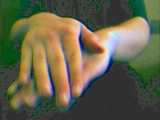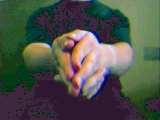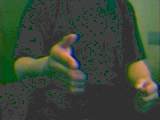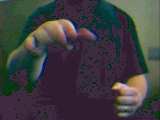Squop-Bristol
Squop-Bristol is a drinking game played by CUTwC that has the advantage of needing no cards or special equipment, may not need the ability to hear each other or to use one’s hands, and has a sliding difficulty scale based on the number of elements included, which makes it suitable for novices. While primarily a reaction game, it does afford some opportunity for tactics (and victimisation). Unfortunately, it does not work well over a videoconference.
The basic game
Squop-Bristol, best played with a relatively large number (say 6-15) of participants, is a game where one player at a time makes what, for want of a better word, I’ll call a move. This move dictates which participant is to make a move next. If a player fails to notice that they are required to act within a short time period (normally a second or so), they are required to drink a fine (it’s normally played with finger fines). The same applies to any participant acting under the mistaken impression that it is their turn so to do. Additionally, if the player does not make their move clear, they will likely be fined.
One participant is deemed to be finesmaster for the duration of the game (unless they relinquish their authority voluntarily). The finesmaster’s word is final in all things to do with fining and rules aribitration. The finesmaster also indicates which player is to make the first move. Normally the game stops whenever a fineable offence occurs, and the finesmaster picks a new participant to start. The finesmaster cannot simultaneously be Club Smith - if the finesmaster incurs Smithood, another player must act as regent until someone else becomes Club Smith. (It is traditional to mime the transfer of a crown to let everyone see this.)
A further complication to this game is the rule of Club Smith. Any player who plays the fourth squop in a row, the fourth Bristol in a row (if Bristols and squops have been swapped), the fourth in a sequence consisting only of Penhaligons, John Lennon memorial shots, kippers and herrings, the fourth Jings in a row, the fourth Crivens in a row (if Jings and Crivens have been swapped), or the fourth in a sequence consisting only of M’chte me and help me Bob, becomes Club Smith (and has to drink a fine). If it is the Club Smith’s turn to act and they have the opportunity to complete four in a row, they have to do so (and drink the fine) or drink a double fine. The finesmaster may declare victimisation rules to be in force if people are picking on the Club Smith, in which case the person sending the third-in-a-row to the Club Smith must also drink a fine. The only way to stop being Club Smith is for someone else to accidentally complete a four-in-a-row and take over the mantle. The Club Smith is required to wear some indicative attire during their Smithood, typically something that restricts their vision, making the game harder. Common options are a club scarf wrapped around the head, or, where available, the Cool Dude Shades (roll-up eclipse glasses).
Most of the moves have hand movements, which aid in clarifying which move has been made, and also allow the game to be played without calling moves, for example in loud pubs. Normally the name of the move is called out when the move is played.
The valid moves are:

|
Squop (hand movement: one hand covering the other in the manner a wink squopping another wink does) makes the next player to act the one at whom the current player is looking. Playing the fourth squop in a row makes you Club Smith. The first move must always be a squop (or a Jings, if Scottish moves are in play). |
Bristol
A Bristol makes the next player to act the one who sent
a squop to the current player; it may only be played
after a squop, and the player must look at a player that is
not the player who will act next.
Note that some winkers may be uncomfortable with the historical
action for Bristol, so it is suggested that a new hand action
be introduced: The player holds one hand face-up to represent
the playing. The fingers of the other hand are held as if
holding a squidger vertically, with the axis of the squidger in
line with the player. The “Bristol” is played by
placing the “squidger” on top of the lower hand
and pulling it back towards the player, in the style of a
Bristol
shot (although this does look a little like cutting the palm
to someone unfamiliar with the shot).
A simpler, but more abstract alternative would be to hold the
lower hand face-up and place the upper hand on it, held
vertically.
Experiments may have to be performed to see which, if either,
is more acceptable.
(Oxford had suggested placing palms together above head height,
much like “jumping the shark” — this may be
a bit likely to cause spillage.)
The historical movement is risqué and therefore edited for sensibilitiesThe historical hand movement was cupping one’s (virtual) breasts, in honour of the Cockney rhyming slang for Bristols. In retrospect it would have been less of a problem had the shot been invented in Hampstead. The hand action is typically performed some way from the actual chest, either for convenience or because of a poor understanding of anatomy; it is not normally intended to be sexual. However, especially in the trappist version of squop/Bristol (as described below) where laughter invokes a fine, it is common to make suggestive movements such as emulating rotating nipple tassles, rubbing one’s nipples, or tipping one’s imaginary breasts off an imaginary tray. Players are encouraged to be aware of the sensibilities of those present when considering such a move. |
|

|
Penhaligon (hand movement: double-handed pot-style bring-in, as for an intentional Penhaligon) makes the next player to act the one standing/sitting immediately to the right of the player of the Penhaligon. Penhaligon has the additional effect of swapping the meaning of squop and Bristol (such that a Bristol makes the next player to act the one the player of the Bristol is looking at, a squop makes the player who Bristolled to the current player the next to play - and a different player must be looked at, a squop may only follow a Bristol, and four Bristols in a row makes the player of the fourth Club Smith). A second Penhaligon re-inverts squop and Bristol. Playing the fourth move in a sequence of four consisting of only Penhaligons, John Lennon memorial shots and fish makes the player Club Smith (as with the fourth consecutive squop). Note that one must look at someone — peering at one’s hands while playing the shot is illegal, otherwise how would you know where to aim the Penhaligon? |

|
John Lennon memorial shot (hand movement: making a gun with both hands, and "firing" it) makes the next player to act the one to the left of the current player (and in that aspect is the opposite of a Penhaligon). A John Lennon memorial shot has no effect on the behaviour of squop and Bristol, however. Playing the fourth move in a sequence of four consisting of only Penhaligons, John Lennon memorial shots and fish makes the player Club Smith (as with the fourth consecutive squop). One must “shoot” another player, not the table or mid-air, and the recipient must not be the next to play after the Lennon. Traditionally, to aid memory of the difference between a Lennon and a Penhaligon, the "recoil" of the shot pushes the “gun” past one’s left ear. |
| When players are new to the game, it is traditional to stick with these moves until they’ve found their feet. Then we get onto the more advanced moves, starting with the fish. The fish moves often cause the game to break down quickly. | |

|
Herring (hand movement: hand held vertical, and wiggled from side to side while moving away from the player, as an impression of a herring) makes the next participant to move the one who immediately follows the player of the herring, in alphabetical order (wrapping), with the current Club Smith given the name “Smith” for considerations of alphabetical order. In addition, a herring swaps the sense of Penhaligon and John Lennon memorial shot — i.e. a Penhaligon makes the next player to act the one to the left of the player of the Penhaligon, and a John Lennon memorial shot sends to the right. Rules are particularly variable on whether the full meaning or just the direction is swapped, but currently it is more likely that an odd number of herrings makes a John Lennon memorial shot (not Penhaligon) invert the meanings of squop and Bristol. A second herring restores the original behaviour of Penhaligon and John Lennon memorial shot. Playing a herring after three consecutive moves consisting of only Penhaligons, John Lennon memorial shots and fish makes the player of the herring Club Smith. |

|
Kipper (hand movement: hand held horizontal, and flapped up and down while moving towards the player, as an impression of a kipper flopping around in a frying pan) makes the next participant to move the one who immediately precedes the player of the kipper, in alphabetical order (wrapping), with the Club Smith being given the name &ldqou;Smith” for considerations of alphabetical order, and in that sense is the reverse of a herring - but it has no effect on Penhaligon and John Lennon memorial shot. It is customary to review names before starting. Playing a kipper after three moves consisting only of Penhaligons, John Lennon memorial shots and fish makes the player of the kipper Club Smith. |
Example
Here is a textual description of a game. We’ll assume that the players are arranged in a circle, with the players numbered as with the numbers on a clock face (as seen from above). Hence, player 1 is to the left of player 12. The players are:
- Matt
- Jessica
- Timmy
- SLU
- James
- Andrew
- Sly
- Patrick (finesmaster)
- Benedict
- Stew
- Christine
- Phil
A game could go like this:
8: (To 3) “Starting without fish, Timmy will begin.”
3: (To 5) “Squop” (5 goes next)
5: (To 6) “Squop” (6 goes next)
6: (To 11) “Bristol” (back to 5)
5: (To 2) “Squop” (2 goes next)
2: “John Lennon memorial shot” (left one, to 3)
3: “John Lennon memorial shot” (left one, to 4)
4: “Penhaligon” (right one, to 3, swaps squop and Bristol)
3: (To 6) “Bristol” (6 goes next)
6: (To 8) “Squop” (back to 3)
3: “Penhaligon” (right one, to 2, restores squop and Bristol)
2: (To 12) “Squop”
12: (To 9) “Squop”
9: (To 4) “Squop”
4: (To 5) “Squop... damn.”
4 has to drink a fine, and is now Club Smith (the worst mistake to make).
8: (To 4) “SLU is Club Smith. Please drink a fine, and then start,
Mr Smith”
4: (Glug) (To 12) “Squop”
12: “Penhaligon”
11: (To 9) “Bristol”
9: (To 3) “Bristol”
3: (To 4) “Bristol”
4: (Sigh) (To 3) “Bristol” (Had the four in a row not been completed,
a double fine would have been invoked)
8: “Thank you Mr Smith. Please drink a fine, and Stew will start.”
10: (To 3) “Squop” (This is a new game, so everything is restored)
3: (To 5) “Bristol”
etc...
After a while, it’s decided to introduce fish.
8: “So fish are now in, and I will start.” (To 1) “Squop”
1: (To 8) “Squop”
8: (To 1) “Squop”
1: (To 3) “Bristol”
8: (To 1) “Squop”
1: (To 8) “Squop”
8: (To 1) “Squop”
1: “Herring” (Matt precedes Patrick, who goes next)
8: “Penhaligon” (Acts as a Lennon after an odd number of Herrings)
9: (To 3) “Squop”
3: (To 4) “Bristol”
9: (To 5) “Squop”
5: “John Lennon memorial shot” (Acts as a Penhaligon)
4: (To 6) “Bristol”
6: (To 3) “Bristol”
3: (To 4) “Squop”
6: “Herring” (Andrew precedes Benedict, who goes next)
9: (To 5) “Bristol”
5: “Kipper” (James follows Christine, who goes next)
11: (To 6) “Bristol”
6: (To 11) “Squop... damn”
Here Andrew has made a mistake, because he should be looking at a player other than the one who goes next. In the same way, Matt would not be allowed to look at Patrick when playing the first Bristol of the game. Andrew drinks a fine, but SLU is still Club Smith. If Sly played a herring, SLU would go next, with his virtual name of “Smith” (and for as long as SLU is club Smith, Sly kippers to Phil).
The Scottish version
That completes the game as usually played in England, but there are also Scottish equivalents to some of these moves, and it has been known for the Scottish moves to be considered legal in an English game. [Ed note: My only experience of these is with purely vocal versions — i.e. no hand movements. If a member of ScoTwA is able to correct me, I’d appreciate it.]
Jings is the equivalent of a squop, but note that a Penhaligon only swaps squops and Bristols, not Jings and Crivens. A Jings is a legal starting move, and Bristol is a valid response to a Jings.
Crivens is the equivalent of a Bristol, and may only be played after a Jings (or a squop), or after a Bristol when an odd number of Penhaligons have been played.
M’chte me is the equivalent of a John Lennon memorial shot, and makes the next player to act the one to the left of the player of the M’chte me. Note that a kipper only affects the direction of Penhaligon and John Lennon memorial shot, not of M’chte me or help me Bob.
Help me Bob is the equivalent of a Penhaligon, and makes the next player to act the one to the right of the player of the help me Bob. In addition, the meanings of Jings and Crivens are inverted (as Penhaligon does to squop and Bristol). As the ScotTwA pages indicate, this should really be pronounced “help ma boab”.
There are also cruel rumours of an Arbroath Smokie, but I’ve yet to experience one in a context other than breaking down the game. The hand action for an Arbroath Smokie is an arm held out at ninety degrees to the body, with the hand hanging loose below it, in the style of a smoked fish.
More obscure variants
Another move that may be allowed is “tales of the unexpected” — which is played by waving arms vertically across each other wrists upwards, crossing and uncrossing one’s wrists in front of one’s face while singing the instrumental theme to the “Tales the Unexpected” TV show. (The title sequence of which includes a silhouette of a woman dancing in this way.) The person at which the player of the “tales of the unexpected” move is looking should be transfixed and emulate a “rabbit in the headlamps” (eyes wide open, frozen in horror, possibly with horrified hands waving on either side of the face). This should continue until someone other than these two says “tish-boom”, miming smacking cymbals together followed by banging a drum. At that point, play continues with the recipient of the tish-boom.
It is possible (and common) to play squop-Bristol silently, in a “trappist” manner. In this case, nobody is allowed to make any noise, even unrelated to the game, on pain of fining. The hand moves should be sufficient to allow moves to be indicated. The finesmaster invites people to start by beckoning to them, and the need to drink a fine is indicated by the finesmaster raising a fist at the finee. If someone needs to say something, they should first grasp the prenominated “scoobydoobydoo device”, say “scoobydoobydoo”, followed by whatever needs to be said. This incurs a fine, but a smaller fine than would otherwise be incurred. If chaos breaks out and the finesmaster wishes to allow speech again, they sing “silence is broken” to the tune of the first three words of “Morning has Broken”. The introduction of silence at the beginning of the game and after a “silence is broken” is invoked by the finesmaster saying “three, two, one...” while raising the appropriate number of fingers in style of Ted Rogers, followed by spreading ones hands face down as if to still waters.
A recent variation of this game requires the initiator of a sequence to start with “squop-category”, where “category” is of that player’s choice. For example, a player may choose to start with “squop-cheeses”. For that round, players of a “Penhaligon” or “John Lennon Memorial Shot” must suffix or prefix that move by an element of that category (for example, “Penhaligon-Brie”). It is an error to repeat a previously-named element, or to fail to name an element. The first player may also start with “squop-more-of-the-same” (in which case, it is still a mistake to repeat an entry which was named in the previous round). An even-more recent variation combines this with the trappist version of the game, in which the finesmaster names a category and players are expected to mime entries in the named category after making the move for Penhaligon or John Lennon Memorial Shot.
An extremely rare version of trappist squop/Bristol/Penhaligon/John Lennon Memorial Shot uses suggestive movements instead (to increase the odds of someone being fined by laughing). In this variant, a squop is represented by winking at someone, a Bristol by blowing a kiss, a Lennon by poking one’s right finger in one’s mouth and pushing on one’s left cheek, and a Penhaligon by moving one’s tongue over one’s upper lip from left to right.
Swap/Pistol
In 2024, a new variant suitable for playing in a swimming pool was invented. Here follows a report by Harley Jones:
Finding ourselves in a pool with no pool-based gaming equipment to hand, it was clear that our experience in CUTwC was going to come in handy. A few rounds of Angle-Dangle-Splash (‘Angle-dangle, splashalash, and away we go...’) were not sufficiently more entertaining than their dry equivalent, so we moved on to Squop-Bristol, and following a series of traditionally poor squops from a novice we were inspired to add a move, namely Swap. This makes advantage of two features of being in a pool: you can move; and it is slightly harder to hear precisely what anyone is saying. After a few rounds all had got the hang of this move, and so its inevitable partner was devised to be indistinguishable audially from Bristol: the Pistol. This move took longer to get the hang of (some would say that we didn’t) but we did deduce its effects with respect to fish. The movement element is added to by the gravitation of players towards that part of the pool edge where they have left their drink.
Swap
This move is made by bringing the hands together vertically in front of you, as if to begin swimming away, pointing at the person you are Swapping, and pronouncing the word ‘swap’.
Its effect is that you swap positions with the player that you are Swapping. ‘It’ is sent to them, and they ought to respond before beginning to move so as not to slow the game down; however, that move is counted as having originated from the Swapped player’s new position.
As a Swap does not send ‘it’ to a new position, it is deemed to be a transparent move for the purposes of four in a row. (Four Swaps in a row have not been seen in the wild, but this author feels that they should count.) ‘Penhaligon — Penhaligon — Swap — Penhaligon — panic’ is therefore a frequently-seen sequence.
Pistol
This move is made by forming a pistol shape with the hands and ‘shooting’ any player. It has the effect of killing the player who is shot, and undoing the previous move.
- If the player shot is Club Smith, there is no longer a Club Smith.
- If the player shot is the Finesmaster, the shooter drinks a fine and becomes the new Finesmaster.
- If the player shot is the player that ‘it’ returns to, the round cannot continue, and the shooter has therefore incurred a fine.
In any case, the player that has been Pistolled should theatrically act out their death and swim to a new position, where they respawn. Particularly if playing with fish, but recommended in any case, the Finesmaster proclaims ‘A new player has entered the game!’ and the new player names themself. (Sharing a swimming pool with The Late Geoff Thorpe was not what I anticipated doing the day after my wedding.)
Note that undoing the previous move is of course different from merely sending ‘it’ back to the previous player. It removes one from the four-in-a-row count, undoes a penhaligon or herring, and, when used as the second move, undoes the start of the game — ‘Squop-Pistol’ becoming the trivial game.
Pistol and Swap interact in exciting ways. Readers are invited to experiment.
It’s clear that fish are appropriate in pool play and will be strongly commended in the next session. On the other hand, Scotland is too cold for swimming outdoors, so Scottish moves are not appropriate.
